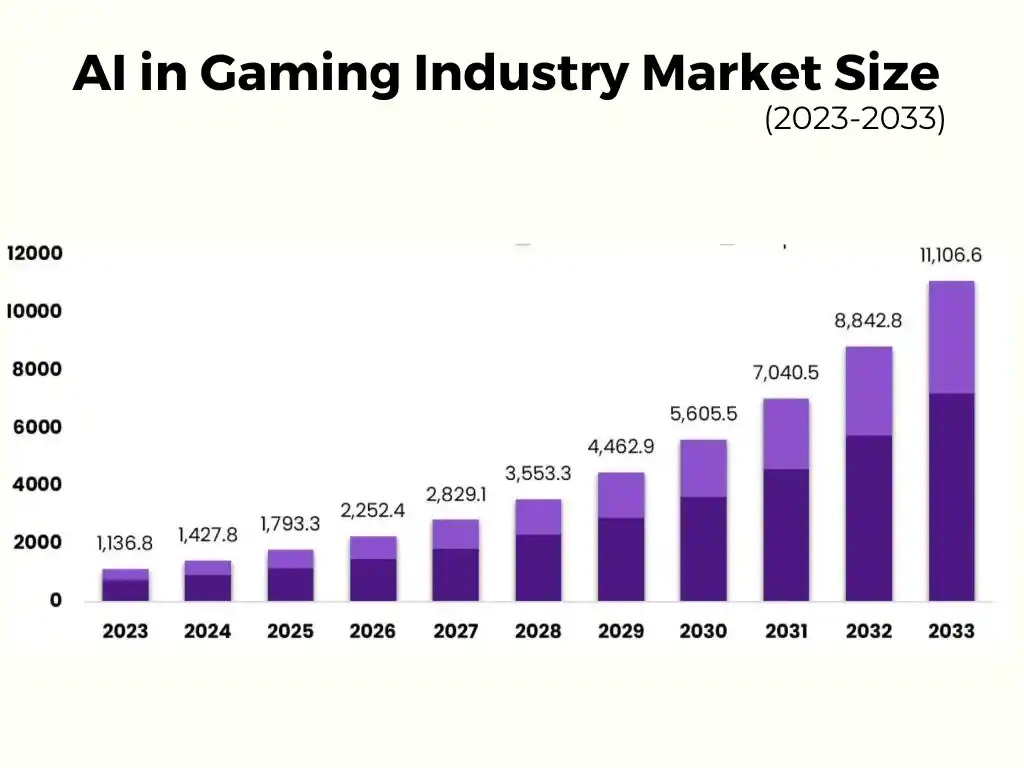Table of Contents
Artificial Intelligence (AI) has rapidly transformed numerous industries, and the gaming sector is no exception. The integration of AI in gaming has not only revolutionized the game design and player experience but also opened new avenues for innovation and engagement. This article explores the profound impact of AI in the gaming industry, delving into its applications, benefits, and future prospects.
Introduction
The gaming business has consistently been at the forefront of technical breakthroughs. From the early days of simple 8-bit games to today’s immersive virtual reality experiences, technology has continuously pushed the boundaries of what is possible in gaming. One of the most significant scientific developments in recent years has been the application of artificial intelligence. By leveraging AI, game developers can create more realistic, engaging, and personalized gaming experiences.
The Role of AI in Game Design
Procedural Content Generation
Procedural content generation (PCG) is a crucial aspect of game design where AI algorithms generate game content automatically. This includes generating levels, environments, characters, and even entire worlds. AI can create vast and diverse game environments that would be impossible to design manually. Games like “No Man’s Sky” and “Minecraft” are prime examples of PCG, where AI is used to create an almost infinite number of unique landscapes and scenarios.
Non-Player Characters (NPCs)
Non-player characters (NPCs) play a significant role in enhancing the gameplay experience. AI-powered NPCs can exhibit realistic behaviors, learn from player interactions, and adapt their strategies accordingly. This makes games more challenging and immersive. For instance, in “The Elder Scrolls V: Skyrim,” NPCs have schedules and routines, making the game world feel more alive and dynamic. AI also enables NPCs to display emotional responses, further enhancing the storytelling aspect of games.
Enhancing Player Experience with AI
Personalization and Adaptation
AI can analyze player data to provide personalized gaming experiences. This includes adjusting the difficulty level based on player skills, suggesting in-game purchases, and even customizing game narratives. By understanding player preferences and behaviors, AI can offer tailored content and recommendations, keeping players engaged for longer periods. Games such as “Left 4 Dead” use AI to dynamically change the difficulty based on the player’s performance, resulting in a balanced and engaging experience.
Realistic Graphics and Animation
AI is instrumental in creating realistic graphics and animations in modern games. Deep learning techniques, such as neural networks, are used to generate high-quality textures, lighting effects, and character animations. AI can also be used to create realistic facial expressions and lip-syncing, making characters more lifelike. This level of realism enhances the immersive experience, drawing players deeper into the game world.
Voice and Speech Recognition
Voice and speech recognition powered by AI has become increasingly prevalent in gaming. Voice-controlled interfaces allow players to interact with games using natural language, providing a more intuitive and engaging experience. This technology is particularly useful in virtual reality (VR) and augmented reality (AR) games, where traditional input methods may be limited. AI-powered voice recognition also enables developers to create more interactive and responsive NPCs, enhancing the overall narrative experience.
AI in Game Testing and Quality Assurance
Automated Testing
Game testing is a critical aspect of the development process, ensuring that games are free of bugs and glitches. AI can automate various testing processes, significantly reducing the time and effort required for quality assurance. Automated AI testing can simulate countless scenarios, identify potential issues, and provide insights into game performance. This allows developers to focus on refining gameplay and enhancing the overall experience.
Predictive Analytics
AI-driven predictive analytics can forecast player behavior, helping developers anticipate trends and make data-driven decisions. By analyzing vast amounts of data, AI can identify patterns and predict how players might interact with different aspects of the game. This information is invaluable for optimizing game design, marketing strategies, and in-game monetization.

The Global Generative AI in Gaming Market is estimated to be worth around USD 11,106.6 Million by 2033, up from USD 1,136.8 Million in 2023, with a CAGR of 25.6% during the forecast period of 2024-2033.
AI in Game Development
AI-Generated Art and Music
AI is increasingly being used to create art and music for games. Neural networks can generate unique artwork and music tracks that match the game’s theme and tone. This not only saves time and resources but also allows for a greater variety of creative content. AI-generated music can dynamically change based on in-game events, enhancing the emotional impact of key moments in the game.
Natural Language Processing (NLP)
Natural language processing (NLP) enables games to understand and respond to player commands in natural language. This is particularly useful in narrative-driven games, where players can interact with the game world using voice or text. NLP allows for more natural and immersive interactions, making the gaming experience more engaging. It also enables developers to create more complex and branching narratives, providing players with a deeper and more personalized experience.
Ethical Considerations and Challenges
Data Privacy
The use of AI in gaming often involves the collection and analysis of player data. While this can enhance the gaming experience, it also raises concerns about data privacy and security. Developers must ensure that they handle player data responsibly and transparently, complying with relevant regulations and protecting player information.
Fairness and Bias
AI in gaming algorithms can sometimes exhibit biases, leading to unfair advantages or disadvantages for players. Ensuring fairness in AI-driven games is crucial, particularly in competitive gaming environments. Developers must carefully design and test AI in gaming systems to prevent unintended biases and ensure a level playing field for all players.
Dependency on AI
While AI offers numerous benefits, there is a risk of over-reliance on technology. Excessive automation can reduce the creative input of human developers and designers, potentially leading to less innovative and diverse game experiences. It is essential to strike a balance between leveraging AI and maintaining the human element in game design and development.

Future Prospects of AI in Gaming
Virtual and Augmented Reality
The future of AI in gaming is closely tied to the advancements in virtual and augmented reality. AI will play a crucial role in creating more immersive and interactive VR and AR experiences. This includes developing realistic virtual environments, intelligent NPCs, and intuitive control mechanisms. As VR and AR technology continue to evolve, AI in gaming will be instrumental in pushing the boundaries of what is possible in these emerging fields.
Cloud Gaming and AI
Cloud gaming is another area where AI is expected to have a significant impact. By offloading processing tasks to powerful cloud servers, AI can enhance game graphics, reduce latency, and provide seamless gaming experiences across devices. AI-driven cloud gaming platforms can also analyze player data to optimize content delivery and provide personalized recommendations.
AI and Esports
Esports, or competitive gaming, has become a global phenomenon, and AI in gaming is poised to play a pivotal role in its future. AI can assist in training professional gamers by analyzing gameplay data and providing insights into strategies and performance. It can also enhance the spectator experience by offering real-time analytics, player insights, and interactive features.
Conclusion
AI in gaming has undeniably transformed the gaming industry, offering new ways to enhance AI in gaming design, player experience, and development processes. From realistic NPCs to personalized gaming experiences, AI is pushing the boundaries of what is possible in gaming. As technology continues to advance, the role of AI in gaming will only grow, offering exciting possibilities for players and developers alike. However, it is crucial to navigate the ethical and practical challenges associated with AI in gaming to ensure a fair and enjoyable gaming experience for all.
The future of gaming is undoubtedly intertwined with the evolution of AI, and the possibilities are as limitless as the imagination of the developers who harness this powerful technology.